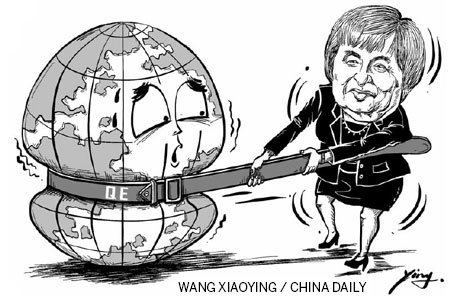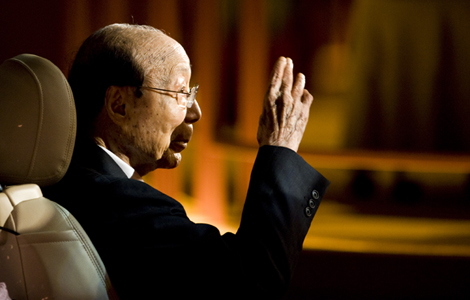Yellen should taper off cautiously
Updated: 2014-01-09 07:42
By Xu Hongcai (China Daily)
|
|||||||||||

The United States Senate on Monday confirmed that Janet Yellen, a key force behind the Federal Reserve's unprecedented and controversial efforts to boost the US economy, will succeed Ben Bernanke as Fed chairman, when his second four-year term expires on Jan 31.Yellen, who is currently the Fed's vice-chair, will be one of the few women heading a central bank and the first to run the Fed in its 100-year history.
Yellen's first task in the world's most powerful financial post will be navigating the central bank's way out of its extraordinary stimulus, beginning with dialing down its bond-buying program.
The Fed cut overnight interest rates to near zero in late 2008 and has quadrupled its balance sheet to more than $4 trillion through a series of massive bond purchase programs meant to push down longer-term borrowing costs, which will promote consumption and investment.
At the last monetary policy meeting last year, the US Federal Open Market Committee announced it would reduce the pace of its monthly massive bond purchases by $10 billion each month, trimming back equally mortgage-backed securities and Treasury bonds, starting January. Such a move signals the Fed is gradually tapering off its quantitative easing on the back of a stronger economic recovery.
Since quantitative easing was just a temporary policy to cope with the global financial crisis, it was only a matter of time before the Fed dropped it. The recent announcement of the reduced bond purchases comes after signs that the US economy is rebounding. The GDP growth rate annualized quarter-on-quarter was 1.1 percent for the first quarter of 2013, 2.5 percent for the second and 4.1percent for the third. Although the core inflation rate has been around 1.7 percent in the past months, approaching the policy limit of 2.5 percent, the Consumer Price Index increased by just 1.2 percent in November. Moreover, the unemployment rate is around 7 percent, and household consumption, company investment and the real estate market have all shown obvious signs of recovery. The above economic indicators all signal the time is ripe for the Fed to start exiting its quantitative easing policy.
Related Stories
US Senate confirms Yellen as Fed's next chair 2014-01-07 08:59
Yellen will focus on domestic economy: analysts 2013-10-11 10:56
US tapering will have limited impact, report says 2014-01-02 15:17
QE tapering of little concern for China 2013-12-24 09:51
Today's Top News
New ambassador to the EU takes up reins
Top court seeks judicial transparency
China has most outbound tourists
Turkey removes police chiefs amid graft probe
Four feared dead in British helicopter crash
Tokyo urged to end militarism
Russia imposes security clampdown in Sochi
Chinese developer inks London deal
Hot Topics
Lunar probe , China growth forecasts, Emission rules get tougher, China seen through 'colored lens', International board,
Editor's Picks

|

|

|

|

|

|





